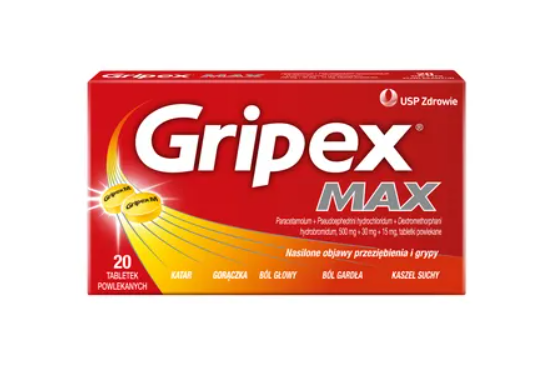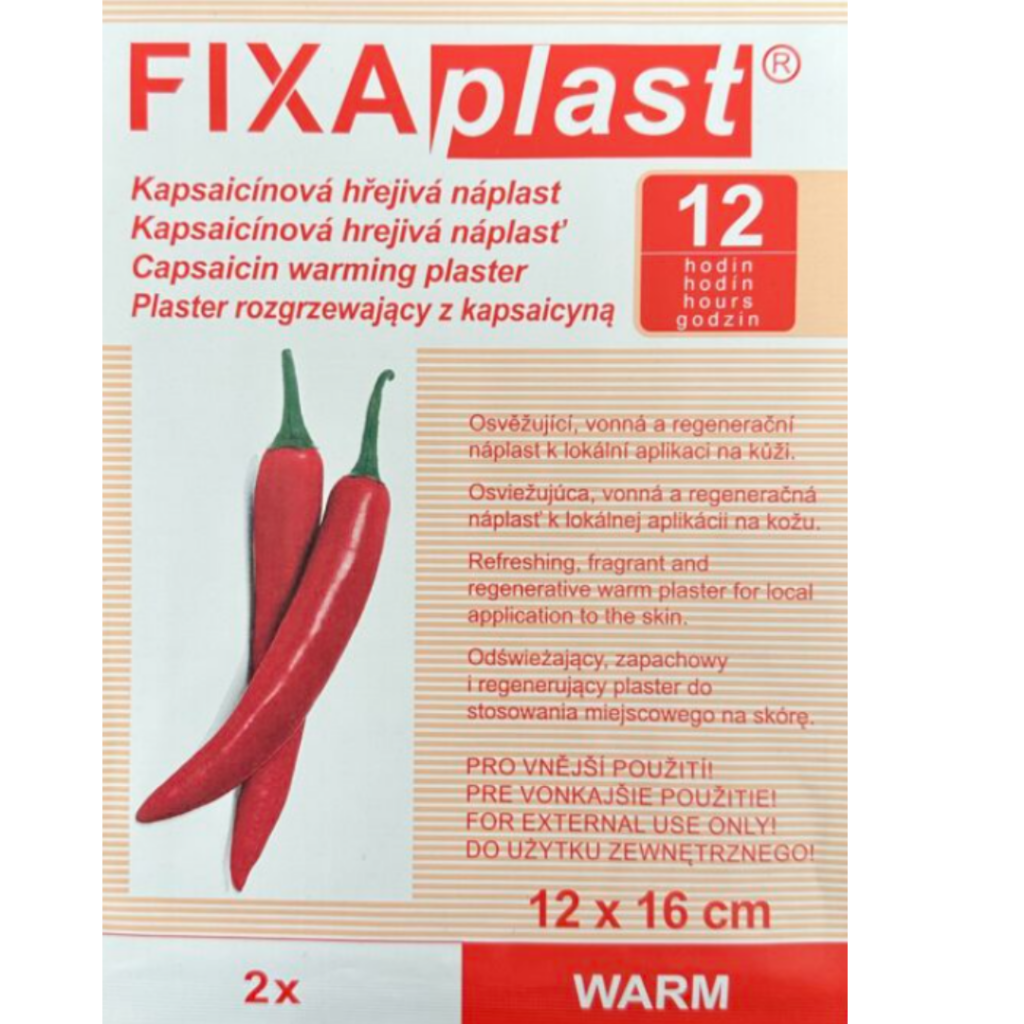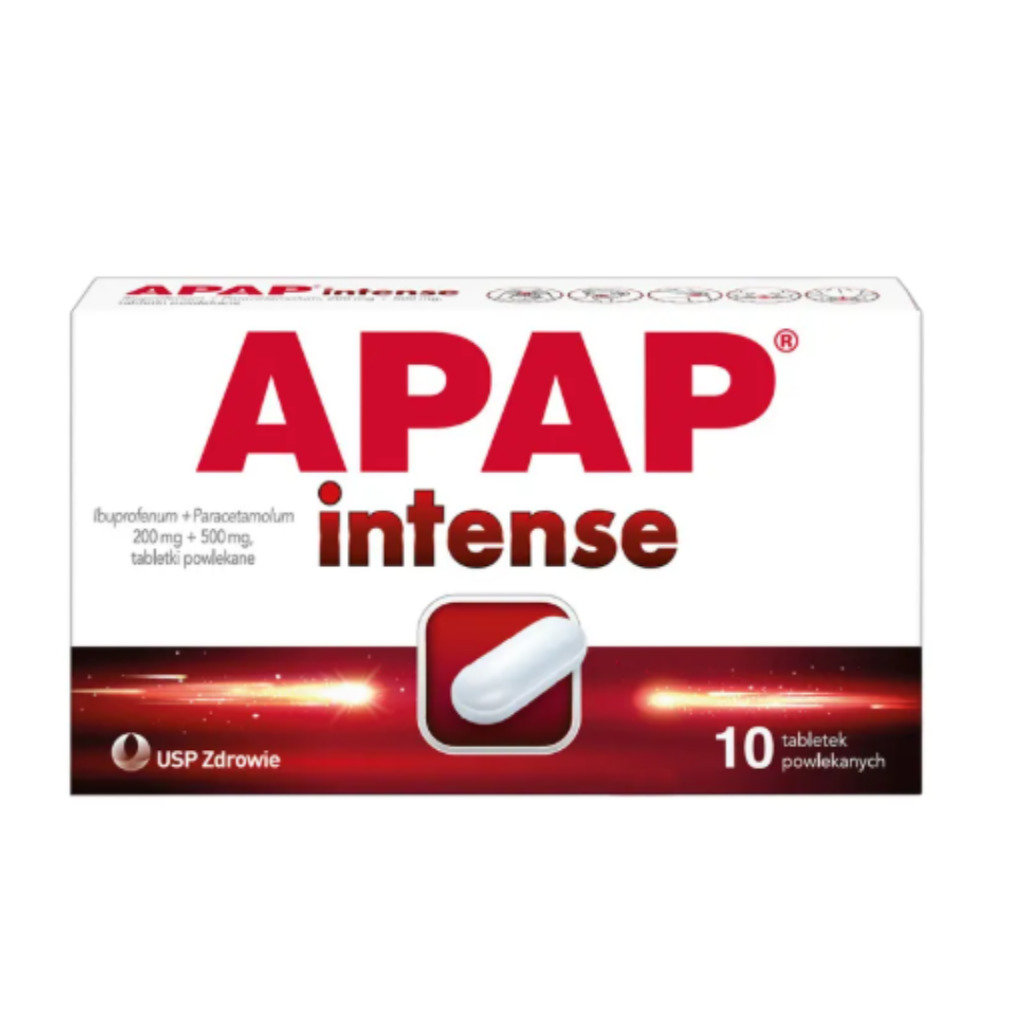Description Gripex Max is a complex medicinal product in the form of tablets that combats symptoms associated with colds or the flu: fever, pain, nasal congestion, and cough.
Composition The active ingredients of the medicine are paracetamol (Paracetamolum), pseudoephedrine hydrochloride (Pseudoephedrini hydrochloridum), and dextromethorphan hydrobromide (Dextromethorphani hydrobromidum).
Each coated tablet contains 500 mg of paracetamol, 30 mg of pseudoephedrine hydrochloride, and 15 mg of dextromethorphan hydrobromide.
Excipients include: tablet core: povidone, microcrystalline cellulose, crospovidone, gelatinized starch, stearic acid, colloidal anhydrous silica. Coating: (Opadry Yellow 03B12395): hypromellose, titanium dioxide (E 171), tartrazine, lake (E 102), macrogol 400 printing ink: (Opacode Black S-1-17823): shellac, iron oxide black (E 172), n-butyl alcohol, isopropyl alcohol, ammonium hydroxide, propylene glycol.
Dosage This medicine should always be used exactly as described in the patient leaflet or as directed by a doctor or pharmacist. If in doubt, consult a doctor or pharmacist.
Adults and adolescents over 12 years of age: orally 1 to 2 tablets, 3-4 times a day.
Do not exceed 8 tablets per day. Action Gripex Max has antipyretic and analgesic effects (paracetamol), acts as an antitussive (dextromethorphan), and restores nasal patency (pseudoephedrine).
Indications Gripex Max is used for the short-term treatment of severe symptoms of colds, flu, and flu-like conditions, such as fever, headaches, sore throat, muscle and joint pain, nasal congestion, and dry cough.
Contraindications When not to use Gripex Max:
- If the patient is allergic to paracetamol, pseudoephedrine hydrochloride, dextromethorphan hydrobromide, or any other ingredients of this medicine.
- If the patient is taking other medicines containing paracetamol.
- If the patient is using MAO inhibitors, also within 2 weeks of discontinuing their use.
- In the case of a congenital deficiency of glucose-6-phosphate dehydrogenase.
- In the case of severe kidney or liver failure.
- In the case of severe hypertension.
- In the case of ischemic heart disease.
- In patients with alcoholism.
- In patients with bronchial asthma.
- During pregnancy and breastfeeding.
- In children under 12 years of age.
Adverse reactions Like any medicine, this medicine may cause adverse reactions, although not everyone experiences them.
Not very often (in 1 to 10 out of 1,000 patients):
- Fatigue, dizziness.
- Nausea and vomiting.
Rarely (from 1 to 10 out of 10,000 patients):
- Hypersensitivity reactions: allergic swelling, anaphylactic reaction.
- Allergic skin reactions, skin redness, rash.
Very rarely (<1/10,000 patients using the drug):
- Blood cell production disorders: decrease in the number of granulocytes in the blood, lack of granulocytes in the blood, decrease in the number of blood platelets.
- Asthmatic attack.
- Liver damage, most commonly due to overdose.
- Renal colic, necrosis of renal papillae, acute renal failure, urinary stone.
- Hallucinations.
Adverse reactions of unknown frequency (frequency cannot be determined based on available data):
- Drowsiness.
- Increased heart rate.
- Slight increase in blood pressure.
- Urination disorders, urinary retention, especially in patients with prostate enlargement.
Warnings and precautions Gripex Max contains tartrazine, lake (E 102), which may cause allergic reactions. Do not store above 25°C. Keep the medicine out of sight and reach of children. Use of other medicines Inform your doctor or pharmacist about all the medicines the patient is currently or recently taking, as well as any medicines the patient plans to use.
Gripex Max may interact with:
- Other medicines containing paracetamol.
- Metoclopramide, propanteline, zidovudine.
- MAO inhibitors (used in the treatment of depression) also within 2 weeks after discontinuation.
- Anticoagulant medicines.
- Medicines that increase liver metabolism (some sleeping pills, antiepileptic drugs, rifampicin).
- Chloramphenicol, albuterol, amitriptyline.
- Sympathomimetic drugs (drugs that reduce congestion, suppress appetite, or have psychostimulant effects).
- Antacids.
- Antihypertensive drugs, digitalis glycosides.
- Fluoxetine, paroxetine, quinidine, terbinafine, amiodarone, flecainide, propafenone, sertraline, bupropion, methadone, cinacalcet, haloperidol, perphenazine, thioridazine, furazolidone.
Use with food and drink Food does not significantly affect the absorption of the drug. Alcohol should not be consumed during the use of the drug.
Pregnancy and breastfeeding If the patient is pregnant, breastfeeding, suspects she may be pregnant, or is planning to have a child, she should consult a doctor or pharmacist before using this medicine.
The use of Gripex Max during pregnancy and breastfeeding is contraindicated.
Use in children and adolescents The drug should not be used in children under 12 years of age.
Driving and operating machinery When taking Gripex Max, caution should be exercised when driving vehicles and operating machinery.
PRODUCT FEATURES
- Gender
- Male
- Female
- AGE
- For teenagers
- For adults
- For seniors
- 20+
- 30+
- Show more …
- PRODUCT TYPE
- Over-the-counter medicine
- FORM
- Tablet
- ACTION/PROPERTIES
- Analgesic
- Antipyretic
- Antitussive
- Nasal decongestant
- ISSUE
- Fever
- Flu
- Cough
- Cold
- Sinuses
- MAIN INGREDIENT
- Dextromethorphan
- Paracetamol
- Pseudoephedrine
- PART OF THE BODY
- Throat
- Bones
- Muscles
- Nose




